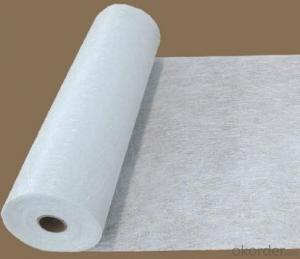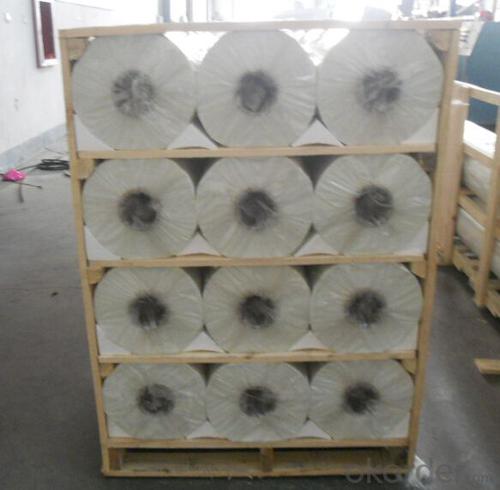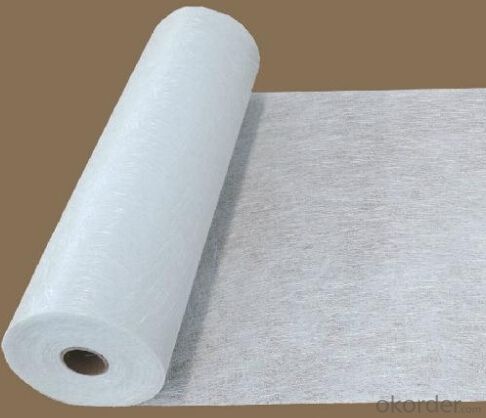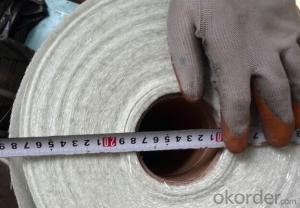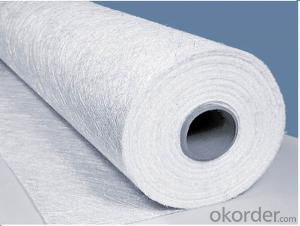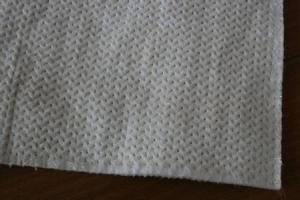Fiberglass Mat Tissue C Glass Fiber Chopped Strand Mat for FRP Tank & FRP Panel
- Loading Port:
- Shanghai
- Payment Terms:
- TT OR LC
- Min Order Qty:
- 4000 kg
- Supply Capability:
- 200000 kg/month
OKorder Service Pledge
OKorder Financial Service
You Might Also Like
Introduction of E-glass Chopped Strand Mat
Chopped strand mat is made from fiberglass chopped strands boned with powder binder or emulsion binder.
This products ischaracterized bg good combination of resin,easg operation ,good wet strengthretention,good laminate transparency
Chopped strand mat is used primarily for hand lay-up processes, filament winding and press molding of FRP products. Typical products include bathroom
accessories, pipe, building materials, automobiles, furniture and other FRP products.
Features of E-glass Chopped Strand Mat
1.Warp and weft rovings aligned in a parallel,flat manner and uniform tension .
2.Densely alighed fibers,providing high dimensional stability ans easy handing .
3.Good moldability,fast and complete resin wet-out ,enabling high productively .
4.Good transporsision and hign strength of the composite products.
5.Even thickness ,no fuzz ,no stain.
6.Fast wet-out ,products with high strength ,little loss for strength in damp situation.
Features of E-glass Chopped Strand Mat
1.the composit products have high dry and wet tensile strenth and good transparency.
2.Low fuzz ,dirt ,impurity and other stain
Images of E-glass Chopped Strand Mat
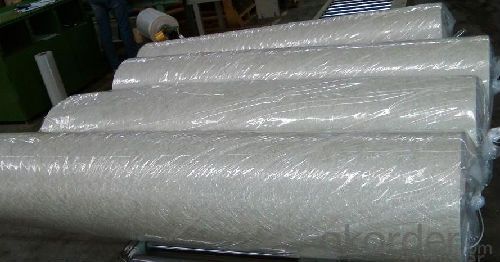
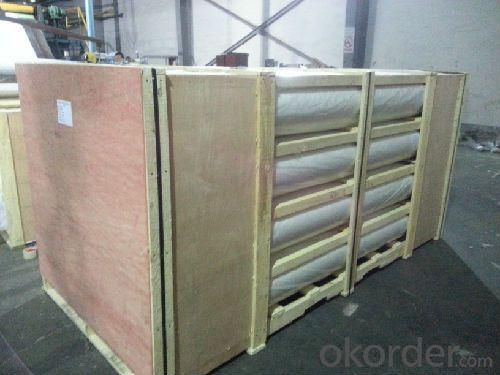
E-Glass Chopped Strand Mat Specification:
Property | Glass type | Weight(g/m2) | Width 200~3300 | Roll Weight | Moisture Content /% | Combustible Content /% | Breakage Strength /N |
Test Method | GB/T 1549 | ISO3374:2000 | ISO3374 | GB/T17470-1998 | ISO3344:1997 | ISO1887:1995 | ISO3342 |
EMC 80 | E-GLASS | 80±16 | ±5 | 6~50 | <0.2< span=""> | 13.6±0.35 | ≥200 |
EMC 100 | E-GLASS | 100±10 | ±5 | 6~65 | <0.2< span=""> | 9.5±0.35 | ≥170 |
EMC 150 | E-GLASS | 150±15 | ±5 | 6~97 | <0.2< span=""> | 8.0±0.35 | ≥40 |
EMC 225 | E-GLASS | 225±22 | ±5 | 6~150 | <0.2< span=""> | 5.0±0.6 | ≥60 |
EMC 300 | E-GLASS | 300±30 | ±5 | 6~180 | <0.2< span=""> | 4.0±0.6 | ≥90 |
EMC 450 | E-GLASS | 450±45 | ±5 | 6~180 | <0.2< span=""> | 3.8±0.6 | ≥120 |
EMC 600 | E-GLASS | 600±60 | ±5 | 6~240 | <0.2< span=""> | 3.6±0.6 | ≥150 |
EMC 900 | E-GLASS | 900±90 | ±5 | 6~190 | <0.2< span=""> | 3.4±0.6 | ≥180 |
FAQ of Chopped strand mat
1. Why Choose us?
CNBM is a stated own company, provide the guarantee for the best quality, best service and safety business.
2. How will we guarantee the quality?
a, ISO 9001-2008 quality control system;
b, Strict and regular quality control in production;
c, Inspeciation when loading into container before shippment;
d, Sample stock for one year for quality tracing and record.
3. What is your MOQ?
Our MOQ is one pallet.
4. Can you provide sample?
Yes, samples are in stock. we can offer free sample for you.
5. Payment terms?
We can accept L/C, T/T etc.
6. Do you offer OEM service?
Yes, we can print customers’ logo on the packaging;
And the size and specification can be produced and design according to your demand.
- Q: Is fiberglass mat tissue suitable for wind energy applications?
- Indeed, fiberglass mat tissue proves to be a fitting choice for wind energy applications. This lightweight and resilient material is often employed in the fabrication of wind turbine blades. It possesses remarkable strength and rigidity, rendering it well-suited to endure the formidable strains and pressures exerted on wind turbines. Furthermore, fiberglass mat tissue exhibits resistance against corrosion and deterioration caused by UV radiation, thereby guaranteeing the durability and functionality of wind turbine blades. In summary, the integration of fiberglass mat tissue into wind energy applications enables the creation of efficient and dependable wind turbines capable of generating clean and sustainable energy.
- Q: Is fiberglass mat tissue compatible with different curing methods?
- Indeed, diverse curing methods are compatible with fiberglass mat tissue. This versatile material can be utilized in various curing processes, including hot press curing, autoclave curing, and vacuum bag curing. Specifically engineered to be compatible with different resins and curing temperatures, the mat tissue is capable of enduring the curing process without any detrimental consequences. Furthermore, the mat tissue is designed to possess excellent wet-out properties, enabling it to effectively bond with the resin during the curing process. Ultimately, fiberglass mat tissue proves to be a fitting option for a wide array of curing methods and can be effectively employed in numerous applications.
- Q: Is fiberglass mat tissue suitable for insulation in sports facilities?
- Yes, fiberglass mat tissue is suitable for insulation in sports facilities. It is a commonly used material for insulation due to its excellent thermal insulation properties, durability, and resistance to moisture. Additionally, fiberglass mat tissue is lightweight and easy to install, making it a practical choice for sports facilities where energy efficiency and temperature control are important factors.
- Q: Can fiberglass mat tissue be used for making insulation jackets?
- Yes, fiberglass mat tissue can be used for making insulation jackets. Fiberglass mat tissue is a lightweight material that offers excellent thermal insulation properties. It can effectively trap heat and prevent it from escaping, making it suitable for creating insulation jackets that provide warmth and insulation.
- Q: Does fiberglass mat tissue provide any UV resistance?
- Yes, fiberglass mat tissue typically provides some level of UV resistance. The fiberglass mat tissue is made up of glass fibers that are embedded in a matrix of resin. These fibers and resin provide some degree of protection against UV radiation from the sun. However, it is important to note that the level of UV resistance may vary depending on the specific composition and manufacturing process of the fiberglass mat tissue. Additionally, prolonged exposure to UV radiation can still cause some degradation over time, so it is recommended to take appropriate measures such as using UV-resistant coatings or finishes to enhance the durability and lifespan of the fiberglass mat tissue in outdoor applications.
- Q: What is the chemical resistance of fiberglass mat tissue?
- Fiberglass mat tissue has excellent chemical resistance due to its composition, which includes a high percentage of glass fibers. These fibers provide a barrier against various chemicals, making the fiberglass mat tissue highly resistant to corrosion and degradation when exposed to acids, alkalis, solvents, and other harsh chemicals.
- Q: Is fiberglass mat tissue suitable for insulation in industrial applications?
- Yes, fiberglass mat tissue is suitable for insulation in industrial applications. It offers excellent thermal insulation properties, high tensile strength, and is resistant to moisture, chemicals, and fire. Additionally, it is easy to install and provides effective heat retention, making it a reliable choice for insulating various industrial equipment and structures.
- Q: Is fiberglass mat tissue resistant to mildew and rot?
- Indeed, the resistance of fiberglass mat tissue to mildew and rot is undeniable. Crafted from delicate glass fibers interlaced to form a robust and enduring substance, fiberglass stands as a paragon. Its non-porous nature prevents moisture absorption, thus endowing fiberglass mat tissue with exceptional resistance against mildew proliferation and rot-induced decomposition. Moreover, fiberglass often receives protective coatings or additives that amplify its fortitude against these biological detriments. For this reason, fiberglass mat tissue emerges as an exemplary selection in settings where humidity or moisture pose a threat, such as bathrooms, outdoor structures, or regions prone to elevated humidity levels.
- Q: Can fiberglass mat tissue be used for interior decoration?
- Fiberglass mat tissue is an excellent option for interior decoration. This versatile material serves multiple purposes and is commonly utilized as a reinforcement for composite materials like fiberglass reinforced plastic (FRP). These materials are often employed to create decorative elements such as panels, wall coverings, and moldings. The fiberglass mat tissue offers a lightweight and durable solution with exceptional strength and resistance to moisture and chemicals. Moreover, it can be easily molded into various shapes and designs, making it a favored choice for interior decoration projects. Furthermore, the fiberglass mat tissue can be coated or painted to match any desired color or texture, enabling a wide array of creative possibilities in interior design.
- Q: What are the potential health and safety concerns associated with working with fiberglass mat tissue?
- Working with fiberglass mat tissue can pose potential health and safety concerns. The fine fiberglass particles present in the air during handling and cutting can be inhaled, leading to respiratory issues such as irritation, coughing, and difficulty breathing. Prolonged exposure to these particles may also result in long-term lung damage. Additionally, direct skin contact with the fiberglass can cause skin irritation and allergic reactions. Hence, it is important to use appropriate personal protective equipment, such as gloves, masks, and goggles, to minimize these risks and ensure a safe working environment.
Send your message to us
Fiberglass Mat Tissue C Glass Fiber Chopped Strand Mat for FRP Tank & FRP Panel
- Loading Port:
- Shanghai
- Payment Terms:
- TT OR LC
- Min Order Qty:
- 4000 kg
- Supply Capability:
- 200000 kg/month
OKorder Service Pledge
OKorder Financial Service
Similar products
Hot products
Hot Searches
Related keywords


